Marci McPhee retired to care for her mother, who passed away sooner than expected. She consulted with the Lord about what to do next and has felt called to a new location every couple of years to provide community service and to learn. (Haz clic aquí para leer la entrevista original en español.)
What’s the short bio version of who you are?
I was born in Germany on a US military base while my dad was in the Army. First grade in Panama, then San Antonio, Texas from second grade on. Because of that experience living abroad, my parents were adventurous travelers and we kids were the same. Wanderlust is in my blood.
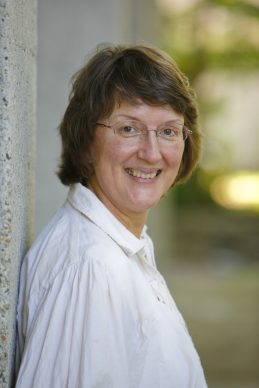
Marci McPhee
I joined The Church of Jesus Christ of Latter-day Saints when I was 16. I found myself at BYU and graduated in two and a half years. I passed my last final two days before my oldest son was born, and then was a full-time mom in the Boston area with four kids.
I later got a part-time secretary job at Brandeis University and retired from there 29 years later as the Director of Campus Programs for the International Center for Ethics, Justice, and Public Life. It’s quite a mouthful with an impossible acronym to boot. Within that time, I took a year of leave to volunteer in 2009-10 for World Teach, teaching English to high school students in the Marshall Islands in the Pacific.
I retired from Brandeis in 2018 because my 93-year-old mom needed me. She moved in with my brother and sister-in-law in San Antonio, and I also moved in to take care of her. She planned to last seven years and make it to 100, but she lasted seven months and had her third and final stroke. I thought, Nice bait and switch, Mom. What am I doing in Texas living with my brother and sister-in-law? I lived there for four and a half years until I felt called to Louisiana, where I am now.
How did you choose the Marshall Islands to volunteer overseas?
I realized that when I travel, I’m skimming the surface of the culture and the people. My motto, as I’ve contemplated travel, is: go far, stay long, look deep. The idea of World Teach in the Marshalls was really appealing to me because I felt that I could learn more and contribute better if I went for a longer period of time.
The seed of the idea to go to the Marshall Islands was planted in the back of my mind a full two decades earlier. When the kids were little, my first husband was invited to apply for a job in the Marshall Islands as a civilian contractor at the US military base on Kwajalein. He decided not to apply. It was way outside his comfort zone, but not mine.
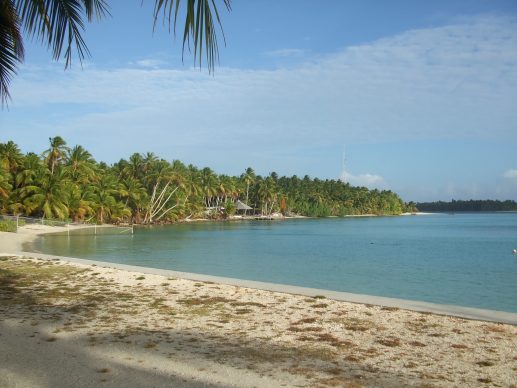
Roi Namur Beach
At Brandeis, decades later, I was running a program that supported undergraduate students in summer internships worldwide. I went to a conference and learned about World Teach. The program has since folded, but it was like an international Teach for America. They had locations in various countries, and one was the Marshall Islands. It caught my eye and I felt like the Spirit said, “This one’s for you.” This was similar to the program I ran at Brandeis, so I read the preparation materials I had written, this time for myself. It was like I had done all this research and written a manual for my future self, and my students field-tested my preparation materials. I did what I taught my students to do.
What were some of your teaching experiences there?
I wanted to learn and also to give. I put those in equal proportions because it wasn’t all about me learning from the people, but neither was it about me giving to the people exclusively because that’s the whole “white savior” nonsense. They have as much to teach me as I have to teach them.
I taught five sections of 10th and 11th grade students. I have a bachelor’s degree in social work with a minor in child development, and I have church teaching experience, but I didn’t have any professional teaching experience. The first thing I learned was that teaching is hard work. We had a month of orientation about making lesson plans, creating exams, classroom management, and teaching ideas, as well as Marshallese language and culture. My assignment was in a regular public school, which included students with special needs and Individual Education Plans. Some students were nearly fluent in English; other students probably didn’t understand a word I said all year. It was an incredible learning curve for me.
One of my favorite things as a classroom English teacher was to give them a journal writing assignment every day. It was language practice for them, but it was also for me to learn. I assigned questions like, “What is this Marshallese holiday? What does it mean to you?” “Tell me about the relationship between men and women in Marshallese society—I see it is a patriarchy but matrilineal; how does that work?” Because they were older teens, they could explain things to me.
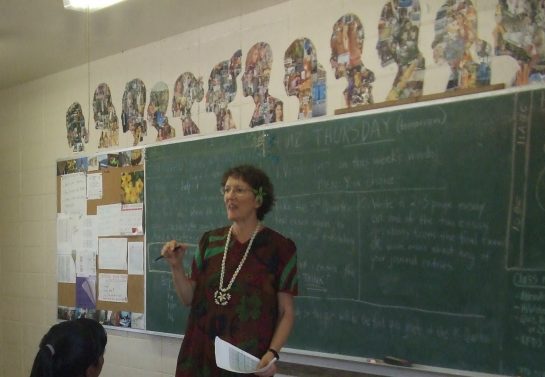
Marci McPhee Teaching in the Classroom
I assigned them to write about the Bikini Atoll nuclear testing. It’s a very grim chapter in US-Marshallese relations. After World War II, the US wanted to learn more about the nuclear weapons they had just unleashed, and they chose the Marshall Islands to do their testing (as well as some tests in Nevada). Bikini Atoll was the westernmost island chain in the Marshalls, the farthest away from trade routes. So the US evacuated the island residents, and pretty much obliterated their homeland. Between 1946 and 1958, 67 nuclear bomb tests were conducted on Bikini—the equivalent of 1.6 Hiroshima bombs detonated every day for 12 years. The nuclear waste is still dissipating, and entire islands and large sections of coral reefs are just gone. I wanted to understand what my students knew and how they felt about it. Their responses included things like: “It was the Americans attacking the Marshallese, trying to destroy us.” Others said that the Americans did nuclear testing but told them not to worry because they had “the cure things.” It was very eye-opening to hear how this sounded from their point of view.
I was also curious to know—what did they understand about the threat of climate change? Some of these low-lying islands are basically glorified sandbars. The entire country’s land mass is 70 square miles total, about the size of Washington DC, broken up into some 1200 individual islands, some of which are microscopic and uninhabited, scattered over a third of a million miles of ocean. They don’t call it Micronesia for nothing. The Marshallese population was about 54,000 at that time (even fewer now)—they could all fit in Foxboro Stadium for a Patriots game with space left over.
With global warming and rising oceans, the islands could one day be gone. I read a New York Times headline: “If a country goes underwater, is it still a country?” The article continued: do they still have a seat at the United Nations? Do they still have fishing rights? One of the main sources of income for the Marshall Islands is selling fishing rights and ship titles to international ships. But even before islands go underwater, the salty seawater infiltrates the land and makes it uninhabitable. Crops don’t grow, the breadfruit and the trees die. One of my students had a pretty good grasp of the situation, but the solution she wrote in her journal was, “So let’s recycle!” I thought, Oh, honey, even if you recycled everything your little fingers ever touched … But she meant it. That was her solution to global warming.
Oh my goodness, I thought she was being sarcastic. “We’re gonna solve all the world’s problems if we recycle three more milk jugs.”
She was dead serious.
The biggest thing that I learned was astonishing generosity. The American mindset is individualistic, but the Marshall Islands are very communal. Once I walked into a store, and I liked the music that was playing so I asked where I could get a copy of the music. They went to the CD player and popped it out, and said, “Here, it’s yours.” I said, “Thank you, what do I owe you?” “Nothing.” I thought they’re a store; their business is selling things. But they wouldn’t take money for the CD.
I lived in Kwajalein Atoll on the high school campus in faculty housing on Gugeegue, several islands down the causeway from the main island Ebeye. My students took the school bus every day from Ebeye to Gugeegue. Every Sunday, I went from Gugeegue to Ebeye to go to church. It’s about a 20 minute ride on the crushed coral causeway that puts car tires at risk, or an hour walk. I was going to walk. The first time I went to church, they were surprised to see me but probably thought I would figure out that the US military base had an LDS branch, and I’d go there with the other white people. The second Sunday, they were really shocked to see me—like hasn’t she figured out there’s another ward? The third Sunday, I was getting ready for church and heard a knock on my door. One of my students, who was LDS, was standing there and he said, “We’re your ride.” My ride? I got in the car but wondered if it was a taxi, or his uncle, or what. If it was a taxi, well, my WorldTeach stipend wouldn’t stretch to cover a taxi every week. When we got to church, the driver just waved me away and the student said, “No, it’s okay.” I went into the church wondering, what just happened? I asked the Branch President and he said the same thing: “Welcome to our islands.” It turned out that they had taken up a collection for me. Here are these Marshallese Saints, some living in homes with dirt floors, taking up a collection for the white English teacher to take a taxi to church.
I wanted to be a gracious recipient, but I didn’t come to drain their wallets. So I arranged to get a ride with the Catholics because their church started at the same time as ours but lasted one hour instead of three. Then I lied about having a ride home and walked the hour back to my apartment. That began my lifetime habit of walking an hour a day. It was just me and the lagoon and the seagulls and the hymns on my iPod, and it was a beautiful thing. That’s the level of generosity—they took up a collection to pay for a taxi for me.
I love how you’re taking the initiative to move somewhere to serve and learn. You’re not following a prescribed program or waiting for someone to tell you what to do—you’re leaning into personal revelation and being creative. When you were in San Antonio, were you looking for service opportunities there? How did you decide in Texas to go to Louisiana?
Let’s back up to Boston. At the change in the missionary age in 2012, the Mission President came to the Boston stake leaders and said, “What am I going to do with an influx of missionaries? Knocking on doors does not work in Boston.” The stake Relief Society President said, “Give them to me; I will put them to work doing service in the community.” A new position was created—the Relief Society Humanitarian Service Coordinator, and I was called to that position. I worked with stake leaders to put those missionaries to work in the community. When I moved to San Antonio, I was called as the Just Serve Specialist. In both cities and callings, I worked with community organizations to find service opportunities for our missionaries and members, and to connect people to them.
In San Antonio, I volunteered with the Center for Refugee Services. The refugees we served, largely from Afghanistan and Iraq, had supported our military overseas. They were the translators and heavy machine repairmen and such, who helped our servicemen and women. When they signed on to do those jobs, we promised that we would take care of them and get them out of the country when we left. So it’s the US making good on promises made to these people who put their lives at risk for our military.
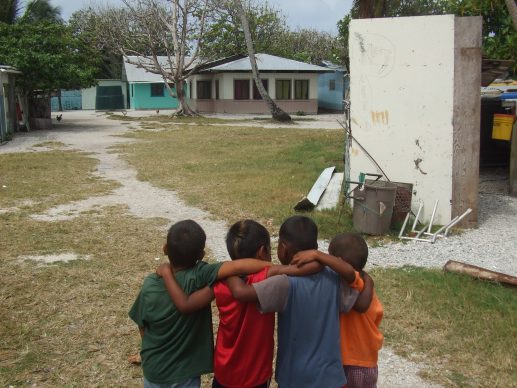
Four Boys in Roi Namur
It was heartbreaking to see the resistance to these refugees, because of the Mexico-Texas border craziness. That’s its own humanitarian crisis, but that isn’t even what we’re talking about here. Supporting the Afghan families was really delicious work. They came to the Center for Refugee Services for support in finding a job, applying for a green card, getting sanitary supplies for the women and girls and diapers for the babies. I loved it all, but my favorite part was when a family would come in with mail they didn’t understand—it sounded so official and threatening but it was junk mail. They were taking English classes but they didn’t know enough yet, so they brought it to the Center and we’d tell them to throw it away, it means nothing. Or they had letters from their landlords, and they didn’t know how to read it and respond. Some were being taken advantage of in their apartment complex situations, and we helped them address that with the authorities.
Another great initiative in San Antonio was with folks who had been vetted at the border. They were legal asylum seekers from Mexico and other Central American countries, allowed into the US by the proper authorities with the proper documentation, coming through San Antonio on their way to their sponsor families throughout the US. I helped to staff a migrant facility—we gave them food and diapers, and helped them find their way to the next place, navigating the bus station or airport. Their bus or flight was often the next day, so a local church opened their doors for overnight guests. We had cots and sleeping bags in classrooms, and their function hall sometimes had hundreds of migrants overnight until they could catch their bus or plane the next day. That was holy work—helping those folks find their way and take care of their families, giving them food, and being a welcoming face.
That’s fantastic. What came next?
So there I was in San Antonio. Mom had passed away. When she died, people asked if I’d go back to Boston. To what? I sold my car. I sold my condo. I quit my job. I gave away everything I owned. Everything was in a container on its way to a Syrian refugee camp. All I had was my books and papers and clothes. If I went back to Boston, I’d have to start all over. I thought, how do I want to spend the rest of my life? I was in my 60s. Both my mother and my grandmother died at age 94 so I figured I had a long way to go, another lifetime.
I took some time after my mom died just to clear my head. Then I said, I think I’m ready for another international volunteer experience. That year in the Marshall Islands was so difficult and simultaneously so rewarding and so mind-expanding. I was ready to do that again but instead of doing it through a program, I felt comfortable doing it myself and working with individuals that I know. I feel drawn to Africa, so I worked with a Ghanaian former grad student in my office at Brandeis who set things up for me to stay in his family compound and volunteer at his high school. I was set to go in August 2020—I had my shots, I had my plane ticket. And then COVID. Ghana was closed by land, sea, and air. Nobody was getting in and very few people were getting out.
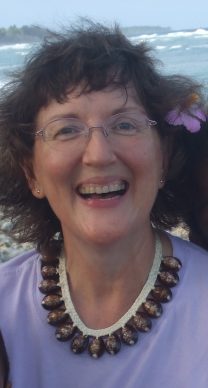
Marci McPhee
That’s when my new career in writing and editing started to take off, much to my astonishment. Rewinding back to Boston again, when I got back from the Marshall Islands, I was called as Stake Primary President. My counselors and I started a blog—this was in 2010, when blogs were really big. We did it for two reasons: one, to provide on-demand training for ward Primary presidencies who were in different stages. Two, because one of my counselors is a firm believer in sign language for kids’ songs, as a way to help them learn the music and keep those little fingers busy. So she posted videos of song sign language.
I said to my counselors, “I think we’re writing a book, chapter by chapter.” After a few years, we looked at what we had, and recruited some folks to fill the holes. I sent it to multiple publishers and landed on Walnut Springs Press. I was floored that, wow, this is really happening. That led to a book about Girls’ Camp, and I contributed essays to several collection books by Linda Hoffman Kimball.
Next, Evan Smith in Boston contacted me in 2020 to help with a book about his experience with LGBTQ issues within the Church. We had a lot of time on our hands because of the quarantine, and we knocked it out in a few months. Through him, I met other people, and my client list snowballed from there. It’s a legitimate income that helps support my very minimalist lifestyle and outrageous travel.
But Ghana was always in the back of my mind. The fall of 2021 was no better for going to Ghana. In the fall of 2022, I still was uneasy about it when a friend said, “What are you waiting for? You could do the same thing in the US.” I realized I could indeed do the same thing in the US. Just go someplace and try to do some good.
I pulled out my mental map—“Okay, God, where are we going?” I had two criteria: near a temple, and someplace warm. I did 43 New England winters and I was done shoveling snow and trying not to slip on ice. At about that time, folks in my San Antonio stake were asked to help clean up New Orleans after Hurricane Ida. They left one Thursday and drove all night, mucked out hurricane-damaged homes on Friday, Saturday, and Sunday, drove back on Sunday night, and were back to work on Monday. If those guys could go to Louisiana for a weekend, I could go for a year.
There’s a temple in Baton Rouge, and I live walking distance from it. My plan was to serve in the temple one day a week, volunteer in the community one day a week, and explore Baton Rouge and New Orleans one day a week. That leaves three days for my writing and editing work, which I can do from anywhere. I asked former co-workers at Brandeis if they knew anyone in Baton Rouge, and one person said, “Yeah, my identical twin sister.” She and I are volunteering at a community gathering place, connecting the people in the neighborhood to different resources. One year has turned into two years here because it takes a while to figure out the right players – how to move things along, figure out the culture and what the community needs, and how to make it work.
It’s the same idea around church service—going where I feel led. I’ve been studying Spanish for a long time and I’m close to getting sorta good at it, at last. A Spanish-speaking branch shares a parking lot with the temple, so that’s where I attend church. I have no calling and no ministering route. I think they think of me as a missionary, and I’m in and out of town a lot, so they let me do my thing. I have three families that I check on, and I consider it my unofficial called-of-God ministering assignment. They fell into my lap and God said, “Take care of these people.” It’s a beautiful thing.
I’m exploring the idea of another volunteer year in Africa in 2024-25, and Panama is in my future, also. People say, “Why don’t you put in your mission papers like everybody else?” It’s self-funded either way so I may as well go where I feel God is calling me. And I’ve spent too many years in bad marriages to want to go on a blind date with a female companion for a year. I like my space. Plus, I’m still working. I wouldn’t be able to be a missionary only a couple of days a week and keep working as an editor.
How many times has President Nelson said that we need to gain personal revelation? We don’t need to surrender to the Church all the time by letting them pick our mission. We can receive personal revelation and forge our own path. If somebody feels their path is to go where the Church wants them to operate, that’s great. But that does not have to be the case all the time. I feel so good about just going where God calls me.
What do you hope other people get from your stories?
I saw a painting of a monk standing on a mountaintop that was big enough for his feet and no bigger, and he’s looking up toward heaven. I used to think that was the goal of life—to arrive at the mountaintop, just you and God. That isn’t it. The goal is to get down in there with the rest of your brothers and sisters. Just as Jesus told Peter: once we are converted, strengthen our brethren (and sistren). I have developed a relationship with my Heavenly Parents, and I completely trust Them to cover my mistakes through the Atonement of Jesus Christ, and to guide me and heal me. Now my job is to look outward and see who needs my help and God’s help. I aspire to a life of carrying to others the healing that has so generously blessed my life, and going where God sends me. I feel so blessed to have learned from and to contribute in some small measure to the beautiful open-hearted Saints in the Marshall Islands, and in Boston, Texas, and Louisiana. And in Africa next year if that’s where the Lord takes me. He’s changed His mind before. I have my plan and He’s taking me down a road. Sometimes it’s, “That’s as far as you need and now we’re gonna go this other way.”
It is such a blessing to walk with God, to wake up in the morning and feel like I’m being sent on errands. I love being God’s errand woman. It’s a blessing to learn and grow and help other people learn and grow and heal. I am in a place of unmistakable privilege to have the flexibility and means to do these things, after two financially disastrous divorces. I liquidated everything and live minimally, and have a completely unexpected income that’s portable. My plan is to continue to go wherever God calls me and do whatever I’m called to do until my last breath.
At A Glance
Name: Marci McPhee
Age: 70
Location: Currently Baton Rouge, Louisiana
Marital History: Twice divorced from temple marriages (with a cancellation of sealing between)
Children: 6
Occupation: Currently writer and editor to Steve Young, David and Richard Ostler, and Fatimah Salleh, among others
Convert to the Church: Yes, age 16 (1970)
Schools Attended: BS in social work from BYU
Languages Spoken At Home: English and sorta Spanish
Favorite Hymn: Varies with my need/mood – at this very moment in time, “For All the Saints,” because of this line: “And hearts are brave again, and arms are strong.”
Website or Social Media You Would Like Featured:: http://marcimcpheewriter.com
Interview Produced By: Trina Caudle
